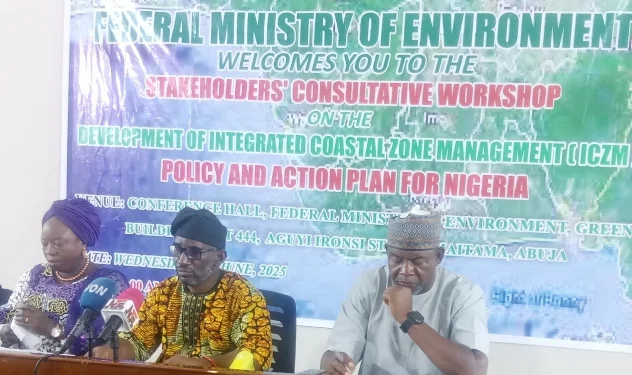Nigeria Bolsters Coastal Protection with New ICZM Policy Framework
Nigeria Bolsters Coastal Protection with New ICZM Policy Framework

The Federal Government is ramping up efforts to safeguard Nigeria’s coastlines by crafting a robust Integrated Coastal Zone Management (ICZM) Policy.
This was disclosed by Mr Mahmud Kambari, Permanent Secretary, Federal Ministry of Environment, on Wednesday in Abuja during a National Stakeholders Consultative Workshop on the policy framework.
Kambari, who was represented by Mr Kunle Awojemila, Deputy Director, Department of Flood, Erosion Control and Coastal Management, said the policy was designed to ensure sustainable use and protection of the country’s coastal and marine resources.
“I express the Ministry’s full commitment to the policy development. We are determined to deliver an actionable framework that will safeguard our coastlines for present and future operations,” he said.
He noted that Nigeria’s coastal regions are not only ecologically important but also economically strategic, contributing greatly to livelihoods, commerce, and biodiversity.
“Unfortunately, these regions are under increasing pressure from climate change, rising sea levels, poor land-use practices, environmental degradation and frequent natural disasters,” he added.
Kambari called on policymakers, researchers, private sector stakeholders, and planners to treat the workshop as more than a dialogue forum, but as a platform for collective action.
“Let us ensure this policy is driven by evidence, inclusive planning, and prioritises the needs of the most vulnerable coastal communities,” he said.
In his remarks, Director of Erosion, Flood and Coastal Zone Management in the ministry, Mr Usman Bokani, expressed concern over the growing threats facing Nigeria’s coastal zones.
Bokani, represented by Mr Abdullahi Atta, Assistant Director, Coastal Zone Management, said the ICZM policy represents a transformative shift towards a structured and inclusive strategy for managing the nation’s marine and coastal ecosystems.
“Erosion, flooding, pollution, and climate change are undermining infrastructure, ecosystems, and human health in coastal areas,” he said.
He emphasised that the development of the policy is important for ensuring the long-term sustainability of Nigeria’s coastlines, enhancing economic resilience, and improving the quality of life in coastal communities.
“With collaborative efforts and informed decision-making, we can build a more resilient and productive coastal management system,” he added.
NAN





0faicz